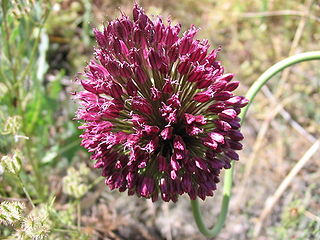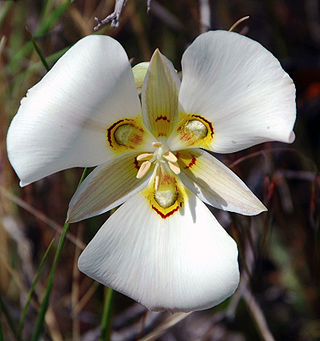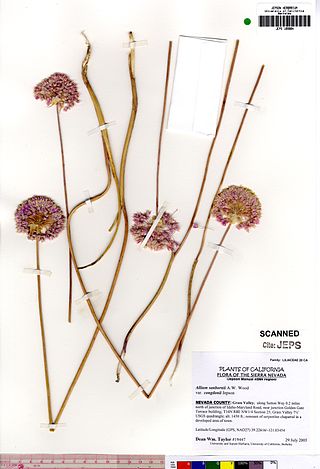
Allium canadense, the Canada onion, Canadian garlic, wild garlic, meadow garlic and wild onion is a perennial plant native to eastern North America from Texas to Florida to New Brunswick to Montana. The species is also cultivated in other regions as an ornamental and as a garden culinary herb. The plant is also reportedly naturalized in Cuba.

Allium sphaerocephalon is a plant species in the Amaryllis family known as round-headed leek, round-headed garlic, ball-head onion, and other variations on these names. Drumstick allium is another common name applied to this species. Some publications use the alternate spelling Allium sphaerocephalum. It is a bulbous herbaceous perennial plant.

Calochortus nuttallii, also known as the sego lily, is a bulbous perennial plant that is endemic to the Western United States. The common name of sego comes from a similar Shoshone word. It is the state flower of Utah.

Allium cernuum, known as nodding onion or lady's leek, is a perennial plant in the genus Allium. It grows in open areas in North America.

Allium acuminatum, also known as the tapertip onion or Hooker's onion, is a species in the genus Allium native to North America.

Allium serra is a California species of wild onion known by several common names, including jeweled onion, pom-pon onion, and serrated onion.

Allium peninsulare is a North American species of wild onion. It is known by such common names as Mexicali onion and Peninsula onion; the former referring to the Mexican city just south of the US/Mexican border, the latter referring to the Peninsula of Baja California. It is widespread in California, USA, where it grows in the California Coast Ranges, Sierra Nevada foothills, some of the Channel Islands, and Peninsular Ranges. The range extends south into the northernmost part of Baja California and north into southern Oregon.

Allium falcifolium is a North American species of wild onion known by the common name scytheleaf onion or coast flatstem onion. It is native to northern California and southern Oregon, where it grows in heavy, rocky soils, especially serpentine soils.

Allium fimbriatum is a species of wild onion known by the common name fringed onion. It is native to California and Baja California.

Allium obtusum is a species of wild onion known by the common name red Sierra onion or subalpine onion. It is native to eastern California and western Nevada. It is a common plant in the granite foothills and mountains of the Sierra Nevada and southern Cascade Range, from Tulare County to Siskiyou County, from elevations of 800 to 3,500 metres. In Nevada, it is reported only from Washoe County in the northwestern part of the state.

Allium howellii is a North American species of wild onion known by the common name Howell's onion. It is endemic to California.

Allium sanbornii is a North American species of wild onion known by the common name Sanborn's onion. It is native to northern California and southwestern Oregon. It grows in the serpentine soils of the southern Cascade Range and northern Sierra Nevada foothills.

Allium stellatum, commonly known as the autumn onion, prairie onion, cliff onion, or glade onion, is a North American species of wild onion in the Amaryllidaceae family that is native to central Canada and the central United States.
Allium elmendorfii is a species of wild onion endemic to Texas. It is known only from Bexar, Frio, Wilson, and Atascosa Counties. It is generally found on sandy soils, specifically "well-drained sands, Eocene, Pleistocene and Holocene sands, and has only a 400 x 160 km range." Its habitat is "Forest/Woodland, Savanna, Woodland - Hardwood" and specifically "{g}rassland openings in post oak woodlands on deep, well-drained sands derived from Queen City and similar Eocene formations."

Allium aaseae, the Southern Idaho onion or Aase's onion, is a plant species endemic to southwestern Idaho. It has been reported from 6 counties: Elmore, Ada, Boise, Gem, Payette and Washington.

Allium columbianum, the Columbian onion, is a species of onion native to eastern Washington, northern Idaho, and the Bitterroot Mountains of western Montana. It is a perennial herb that grows on shallow, wet soils at elevations of 300–1100 m.

Allium geyeri or Geyer's onion is a North American species of onion widespread in the western United States and in western Canada. It is found in the Rocky Mountain States from New Mexico to Idaho, Great Basin, the Pacific Northwest, Texas, South Dakota, Arizona, Manitoba, British Columbia, Alberta and Saskatchewan.
Allium runyonii is a North American species of wild onion native to southern Texas about as far north as Corpus Christi, as well as to the Mexican States of Nuevo León and Tamaulipas. It is found on sandy soils including in plains along the Río Grande.

Allium scilloides, called the fragile onion, is a plant species endemic to the US State of Washington. It has been reported from only 4 counties, all on the eastern side of the Cascade Range: Klickitat, Kittitas, Yakima and Grant. It grows on barren, gravelly slopes at elevations of 300–1300 m. The species is sometimes cultivated in other regions as an ornamental.

Allium tolmiei is a plant species native to Idaho, eastern and central Oregon, southeastern Washington, northwestern Nevada and northeastern California. It occurs on mountains and scrublands at elevations of 1,300–9,200 feet (400–2,800 m). It was discovered by and named for Dr. William Fraser Tolmie.

















